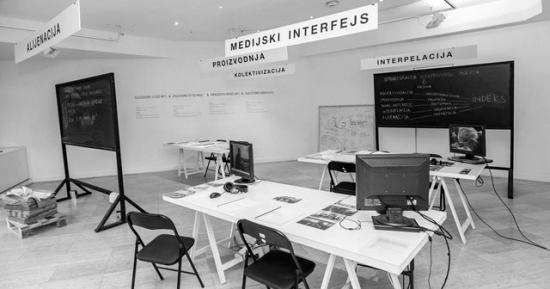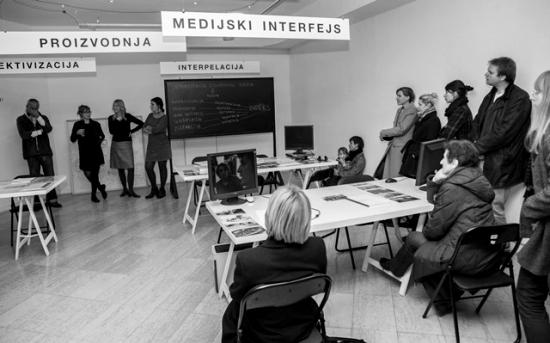Grupa Spomenik: Yugoslavia Studies
Grupa Spomenik/Monument Group
(Damir Arsenijević, Ana Bezić, Jasmina Husanović, Pavle Levi, Jelena Petrović, Branimir Stojanović, Milica Tomić)
in collaboration with:
Delve | Institute for Duration, Location, and Variables (Ivana Bago and Antonia Majaca)
Galerija Miroslav Kraljevic, Zagreb
19.11.2012. - 15.12.2012.
The exhibition is the first substantial presentation in Zagreb of the work of Grupa Spomenik, imagined not as a retrospective, but rather as a process of open – and through the form of exhibition, spatialized – editing and the first phase of the production of the Group's book. The exhibition also marks the continuation of collaboration between Delve and Grupa Spomenik, initiated in the framework of the project WEIYTH: Where Everything is Yet to Happen: Exposures in 2010.
Exposures was a temporary critical and artistic regional platform which (re)activated the questions pertaining to the devastating social, economic, and political repercussions of the violent break-up of Yugoslavia, underlining one of the initial premises of Grupa Spomenik: that we can not talk about the present in terms of a post-war state. On the contrary, what we have is a war continuing by other means, whose reality we live on the ideological, political, cultural, economical, and material level.
Grupa Spomenik is an artistic and theoretical group formed around the problem of the impossibility of constructing and naming monuments of the war(s) of the 1990s in Yugoslavia. During the last ten years, Grupa Spomenik has initiated reading and discussion groups, staged lecture-performances, and engaged in a process of self-education through encounters and discussions with victims, perpetrators, and witnesses of the extreme terror, genocide, and ethnical cleansing in the wars of the 1990s in Yugoslavia. It has initiated a process which situates all actors in the midst of a rift which disables and dismisses the attitude of moral superiority or the evasion of responsibility. The main position of Grupa Spomenik is that memorization is an act of assuming a political position in the present, because no act of memory is devoid of political subjectivization.
The exhibition will take the form of a working archive for a book in the making, reflecting on the three phases in the work of Grupa Spomenik: Prologue: Social Trigger, Matheme, and What is the name of war today?. These three phases will be connected, read, and edited in the process of the book creation, based on the following paradigms: collectivization, production, public interface, interpellation, and alienation. Grupa Spomenik is thus formed through the intersecting points which are at the same time the points of contestation, differences, and conflicts revolving around Yugoslavia as a social and political signifier. The overlapping and connecting points, however, allow us to think the concept of Yugoslavia Studies, as a place of political subjectivization in the process of producing and activating the knowledges about war.
The exhibition connects art, theory, and politics within a relational signifier of the book, activating the social and political field of subjugated knowledges, problematizing the arbitrary interpretations of war, the ideology of reconciliation, and, finally, bringing the ‘local’ war and the current local and global economic crisis in a relation that is otherwise ignored or denied.
The basic question to be posed in the framework of two public discussions with the Faculty of Philosophy Plenary Session initiative, and with the protagonists of the contemporary art scene in Zagreb is the following: Why is the topic of war absent in these two fields of intellectual public sphere in Zagreb? The aim of the exhibition Grupa Spomenik: Yugoslavia Studies is therefore twofold: to show the archive of the ten-year long work of the Group as a unique artistic, intellectual, and activist practice and to open two discussions on the topic war: in the field of visual arts, and the field of new political initiatives. In this sense, the exhibition seeks to animate the reflection of these topics from the perspective of past or existing projects and initiatives in the local context, and, not less importantly, for activating new ones.
Sponsors: City of Zagreb, Ministry of culture of Republic of Croatia



